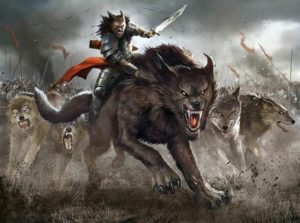Dungeon World includes a wonderful mechanic called fronts, which describe larger-scale threats that the PCs may face: a cult, a horde of orcs, a powerful wizard, a natural disaster, etc.
Fronts have quite a few moving parts, though:
- Scale (campaign-level or adventure-level)
- Dangers (people, monsters, traps, unstable artifacts, etc.)
- An impending doom for each danger
- Grim portents (1-3 for an adventure front, 3-5 for a campaign front)
- 1–3 stakes questions (unanswered questions about how the danger relates to PCs or NPCs in the campaign)
- NPCs within the front
Nothing wrong with that, but it’s a little too heavy for my tastes.
Separately, Alex Schroeder modified fronts into this structure:
- A catchy name (“Slaad Invasion”)
- A short phrase to describe it, a subtitle (“The Manifestation of of a Slaad Lord”)
- A number of events with escalating effect (“war in the land of the fire giants”, “war of the god men against Asgard”, …) – a list of things that I can look down on when there’s a lull and improvise some calamity, an encounter, a news item, whatever; “announcing future badness”
- A question or two regarding a player character; this will help me twist and turn the dagger so that it’ll end up pointing in their direction; it also reminds me to have daggers pointing at every single one of them (“Will Logard fight this anarchy?”, “Who will help the dwarves?”)
However, Alex’s fronts don’t capture the “who” behind the front.
So, here’s my version:
- A catchy name (“The Insane Cult of Cat-People”)
- Who leads it (often multiple people)
- Resources at the group’s disposal (artifacts, armies, land, contacts, etc.)
- What the group wants in concrete terms (not “more power” but “changes to the city’s laws”). This can be written like a manifesto. If the group had complete control, how specifically would the world be different?
- The group’s plans. If nothing else changes, what will the group do next? And then what? And then what?
This can fit on one piece of paper or just a few index cards, and you’re good.

